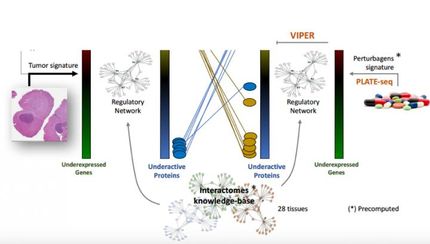UNIchip protein biochips from Protagen identify significant off-target binding for TNF-alpha inhibitors
Findings could explain side effects seen with these biological drugs for treating rheumatic diseases
Tumor Necrosis Factor (TNF)- inhibitors used to treat rheumatic diseases may bind to a significant number of proteins other than their main target, according to the results of an in vitro study published in Analytical and Bioanalytical chemistry. This off-target binding activity might explain some of the side effects reported for these commonly used biotherapeutics.
Researchers from University Children's Hospital Düsseldorf, Ruhr-University Bochum and Protagen AG used protein biochips to investigate the protein binding activity of three protein therapeutics for the treatment of Rheumatoid Arthritis and Juvenile Idiopathic Arthritis. Infliximab (Remicade®, Centocor) is a chimeric human and mouse antibody; Adalimumab (Humira®, Abbott) is a recombinant humanized monoclonal anti-TNF- antibody; and Etanercept (Enbrel®, Amgen and Wyeth) is a fusion protein consisting of a TNF- receptor and the Fc portion from a human IgG1 antibody.
Side effects of Infliximab include hypersensitivity and other symptoms such as fever, itching, difficulty in breathing and chest pain, which could be caused by the patient experiencing an immune reaction to the murine component of the antibody. The side-effects of the other two drugs include an increased risk of contracting serious infections, as well as other problems that could be the result of a treatment-induced autoimmune response.
The researchers incubated UNIchip® AV-400 protein biochips with the TNF- blocking agents to check their respective specificity. Each set of protein biochips contained a printed serial dilution of naturally folded TNF- and a random selection of 384 different recombinant human proteins. Though the concentration of drugs used in the experiment ensured that these all had the same level of TNF- binding activity in vitro, the products showed severe differences in specificity.
Infliximab was the most specific antibody with no off-target activity detected. Both Etanercept and Adalimumab showed off-target activity, with Etanercept binding to 10 proteins with affinities greater than 20% of its binding affinity for TNF-. Adalimumab bound 19 proteins other than TNF-, though its affinity for these was lower, at only 12-18% of its affinity for TNF-. Several of these proteins are involved in the assembly of ribosomes and protein synthesis.
The authors said: "TNF- inhibitors have been shown to be highly efficient and clinically useful drugs for the treatment of rheumatic diseases. At the same time there are reports about adverse side effects associated with TNF- inhibitor treatment. Although there is no direct evidence that the off-target activity we have seen leads to pathological consequences, this link cannot be excluded."
Other news from the department research and development

Get the life science industry in your inbox
By submitting this form you agree that LUMITOS AG will send you the newsletter(s) selected above by email. Your data will not be passed on to third parties. Your data will be stored and processed in accordance with our data protection regulations. LUMITOS may contact you by email for the purpose of advertising or market and opinion surveys. You can revoke your consent at any time without giving reasons to LUMITOS AG, Ernst-Augustin-Str. 2, 12489 Berlin, Germany or by e-mail at revoke@lumitos.com with effect for the future. In addition, each email contains a link to unsubscribe from the corresponding newsletter.





















































